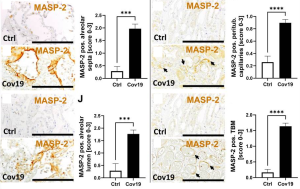A group from Department of Nephropathology, University Hospital Erlangen, Friedrich-Alexander-University (FAU) Erlangen-Nürnberg, Erlangen, Germany, etc. has reported that complement activation might be involved in systemic worsening of COVID-19.
https://www.ncbi.nlm.nih.gov/pmc/articles/PMC8884149/
One pathway potentially involved in the SARS-CoV-2 driven inflammatory cytokine overproduction is activation of the complement system. This system, which belongs to the innate immune system, acts as a crucial component in the defense against infection by opsonizing pathogens or damaged cells, attracting and activating leukocytes or directly lysing bacteria or cells through the membrane attack complex.
Initiation of the complement cascade can be done by three different pathways, the classical pathway, the lectin pathway, and the alternative pathway.
The classical pathway is activated by immune complexes (antigen-IgM and antigen-IgG complexes) and many other self and non-self molecules binding to C1q, leading to a conformational change, and activating serine proteases C1s and C1r.
The lectin pathway is activated by plasma-circulating lectins (collectins like mannan-binding lectin and ficolins) recognize carbohydrate patterns on the surface of microorganisms, called pathogen-associated molecular patterns (PAMPs), and activate MAPS-1 and MAPS-2 which cleave C4 to C4a and C4b.
The alternative pathway is constantly active at a low level and is initiated by spontaneous hydrolysis of C3. Hydrolysed C3 binds to factor B (CFB) which acts as a substrate to serine protease factor D (CFD), resulting in formation of a C3 convertase.
In the end, all 3 complement pathways can lead to C3 convertase activation which cleave C3 to C3a and C3b, followed by the same pathway triggering the formation of the membrane attack complex (MAC).
In this study, though comparative study of autopsy lung and kidney tissue samples died from COVID-19 with those of died from non-COVID-19, it was found that the lectin pathway was activated in both lungs and kidneys of patients with severe COVID-19. Activation of the lectin pathway was supported by staining for C4d in the same localization as described for MASP-2, suggesting that complement activation might be strongly involved in systemic worsening of COVID-19 inflammatory response.
< a href="">
